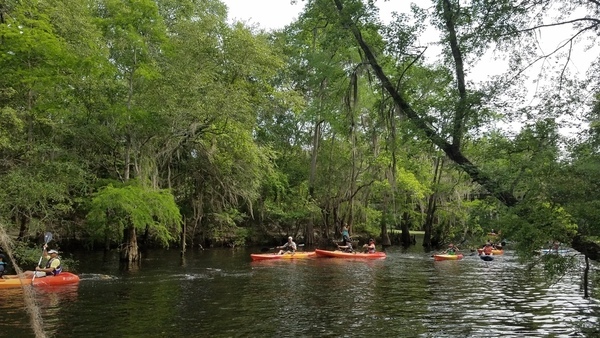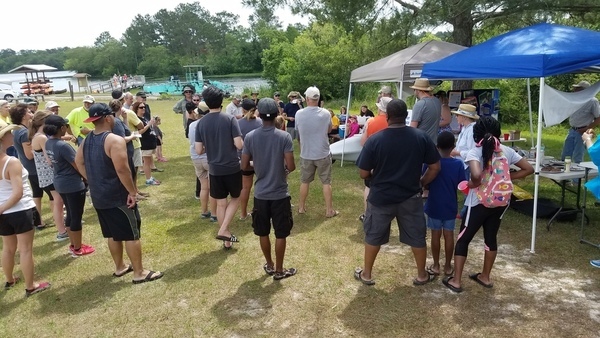News Stories about WWALS 2017.
For the rest see News.
- Staff Reports, Albany Herald, 28 November 2017,
Riverkeepers ask court to shut down Sabal Trail pipeline:
Group calls FERC impact statement factually incorrect, irresponsible,
HAHIRA — “Factually incorrect, failing to account for LNG export or solar power, and irresponsible for not finding or creating a method for attributing environmental effects to greenhouse gases, as the D.C. Circuit Court had instructed the Federal Energy Regulatory Commission (FERC) to do.”
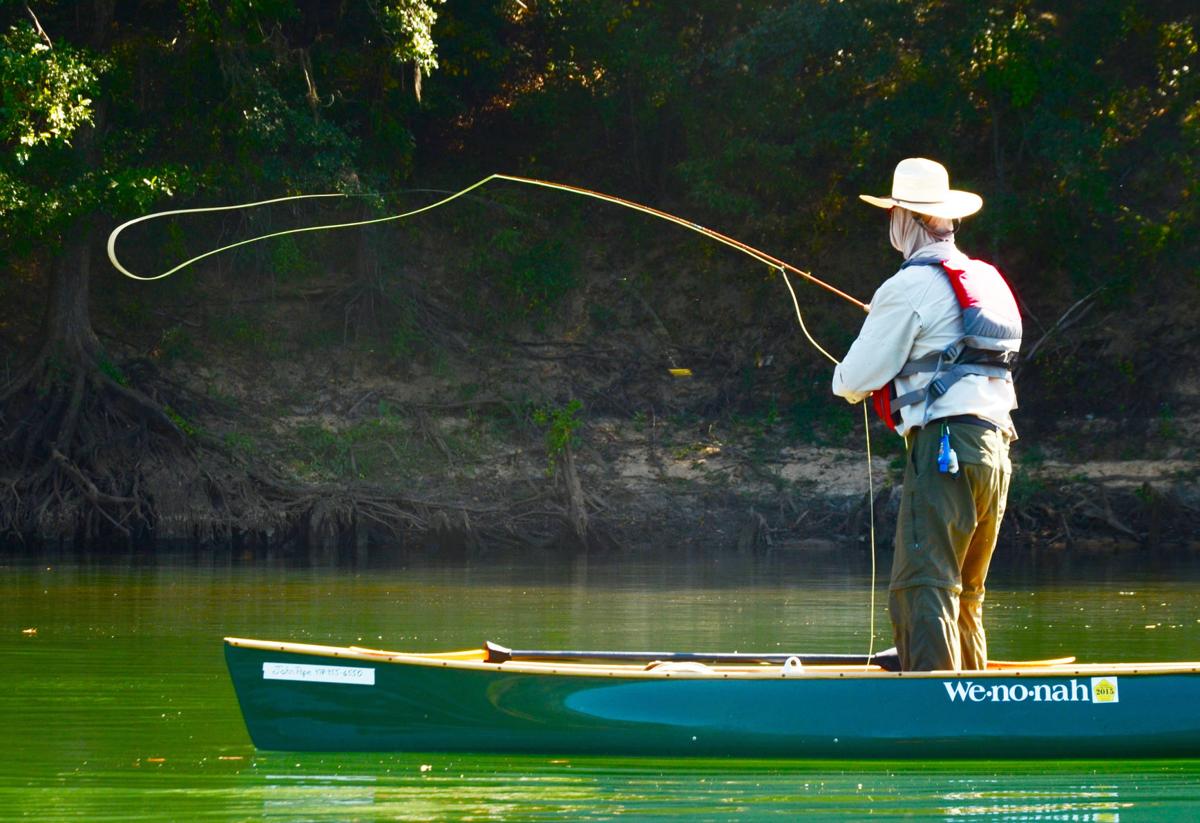
Georgia Riverkeeper groups are asking a federal agency to shut down the Sabal Trail natural gas pipeline. Photo: Albany Herald.[See WWALS PR for the rest.]
 Amy Martyn, ConsumerAffairs, 14 September 2017,
Company says its natural gas pipeline ‘operated safely’ through
Hurricane Irma; However, activists say the Sabal Trail Pipeline is
dangerous and needs to be removed (WWALS blog post: Who do you believe? A local county fire department, or someone paid by a pipeline company to put the best face on any event? Especially when she didn’t actually deny anything Marion County Fire Rescue reported?)
Amy Martyn, ConsumerAffairs, 14 September 2017,
Company says its natural gas pipeline ‘operated safely’ through
Hurricane Irma; However, activists say the Sabal Trail Pipeline is
dangerous and needs to be removed (WWALS blog post: Who do you believe? A local county fire department, or someone paid by a pipeline company to put the best face on any event? Especially when she didn’t actually deny anything Marion County Fire Rescue reported?)
- John S. Quarterman, Valdosta Daily Times, 28 July 2017,
Georgia Power has opportunities to lead in solar power,
Thanks, VDT, for your Sunday solar story and editorial!
Your editorial’s “buyer beware” would better be directed towards the electric utilities, which set up the price mismatch that caused the problem for the customer in your story. The story says, citing John Kraft of Georgia Power, “The utility company offers to pay the producer only as much as it costs to produce solar power. If a utility company can produce solar energy at a solar farm for 5 cents per unit, it isn’t going to pay a residential producer a higher rate for energy it doesn’t need.”
If Georgia Power does not need new energy, why is it building two new nuclear units at Plant Vogtle and charging its customers in advance every month? Four years ago….
-
News coverage of charges dropped against Sabal Trail protesters, 17-18 July 2017
“Even with Sabal Trail, the fight is not over,†Quarterman said. “The case brought against FERC by Sierra Club, Flint Riverkeeper, and Chattahoochee Riverkeeper has not been decided. Even if the gas keeps flowing, we all have to watch for sinkholes, leaks, polluted wells and explosions.â€
Jamie Wachter, Suwannee Democrat, 27 June 2017 (also Waterkeeper Alliance 28 June 2017, and Valdosta Daily Times page 8A 28 June 2017 but apparently not online), Gas now flowing through Sabal Trail pipeline (WWALS blog post),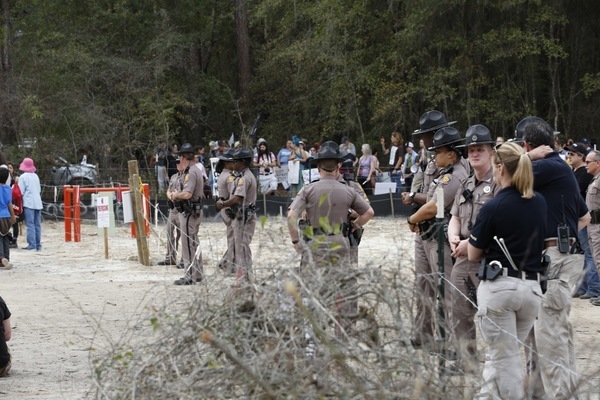
Photo: Beth Gammie for WWALS, Suwannee County, Florida, 14 January 2017
Is this a good use of Florida local and state law enforcement?
Protecting an invading, unnecessary, pipeline from the unarmed public?The pipeline’s first phase is supposed to provide service to Florida Power & Light to meet the start of its peak cooling season, Grover said.
Note Ms. Grover’s careful phrasing “to meet the start of its peak cooling season”. She’s backed off from Sabal Trail’s previous claim that its gas was needed to meet peak summer demand, perhaps because, as WWALS spelled out before the gas was turned on, and as an analyst on a leading stock blog has now determined because the gas is flowing, there was no need for Sabal Trail; all it is doing is reducing gas flowing through FGT and Gulfstream with no net increase into Florida….
- Noelani Mathews, WCTV, June 15, 2017,
Local environmentalist groups prepare for Sabal Trail Pipeline to go online (WWALS blog post),
 “We… always did a lot online and through legal angles and we’re
going to continue doing a lot of that,” says John Quarterman, WWALS
President. “If we hear about a sink hole or a leak, we’ll be there
taking pictures.”
“We… always did a lot online and through legal angles and we’re
going to continue doing a lot of that,” says John Quarterman, WWALS
President. “If we hear about a sink hole or a leak, we’ll be there
taking pictures.”
-
Kate Payne, WFSU, 14 June 2017, Sabal Trail Pipeline Slated To Start Up This Week (WWALS blog post),
The 515 mile underground pipeline spans twelve Florida counties, and runs through the heart of the state’s springs country. Suwannee Riverkeeper John Quarterman is worried how the underground natural gas line could affect the state’s signature waterways and springs in the area. He’s concerned pollution from the project, like road runoff and drilling mud, could ultimately seep through the porous limestone into the subterranean waterways that make up the Floridan aquifer. That’s the water source for some 10 million people.
“The nature of the springs in the springs heartland of Florida is, not just down at the levels where the aquifer are, but right up at the surface, there’s cracks all through this limestone,” Quarterman said.
Quarterman says activists will continue to monitor the project for possible leaks or sinkholes.
“I see no reason why anyone should accept any risk to the outstanding Florida waters, the Suwannee River, the Sante Fe River, the Withlacoochee South River, or of course to our Withlacoochee River in Georgia,” he said.
-
Susan Salisbury, Palm Beach Post,
12 June 2017,
Sabal Trail gas pipeline starting up; group seeks FERC reform,
That same day the worldwide Waterkeeper Alliance, which opposes the pipeline, called for an overhaul of FERC at the U.S. Congressional level. The agency is funded through costs recovered by the fees and annual charges from the industries it regulates.
Suwannee Riverkeeper John Quarterman, a member of the Hahira, Ga.-based WWALS Watershed Coalition, said the start-up of the pipeline does not mean their legal challenges and public opposition are over. “The case brought against FERC by Sierra Club, Flint Riverkeeper and Chattahoochee Riverkeeper has not been decided,” said Quarterman. “Even if the gas keeps flowing, we all have to watch for sinkholes, leaks, polluted wells and explosions.”
-
Alexis Bonogofsky, Truthout, 8 June 2017,
“This State Is on the Front Lines”: Floridians Mobilize Against Sabal Trail Natural Gas Pipeline (WWALS blog post),

Sabal Trail Reunion Compressor Station
Photo: Mark Skogman for WWALS on Southwings flight, 2 February 2017John Quarterman, head of the WWALS Watershed Coalition — which advocates for the Withlacoochee, Willacoochee, Alapaha, Little and Suwannee River watersheds — has fought the Sabal Trail pipeline since it was first announced in 2013. He points to many different incidents in which the pipeline company has damaged the environment and the people in the communities it goes through. He documented these offenses on WWALS’s website. The real kicker, Quarterman says, is that the reason the utilities gave for needing the pipeline is completely bogus.
“This pipeline is totally unnecessary and [its unnecessary nature] was admitted to by Florida Power and Light. They stated in their 10-year plan they submitted to the Florida Public Service Commission (PSC) in 2013 [that Florida needed 13% more electricity in the coming decade, and they used that claim to sell Sabal Trail to the PSC and to FERC. Yet FPL contracted that in its 2016 Ten Year Plan, which said Florida needs] no new electricity capacity until 2024 at the earliest.” Quarterman told Truthout.
The text in [square brackets] is my correction of a typo in the article.
- Lee Henderson, Valdosta Today, 5 June 2017, Morning News Briefs for 6-5-17,
There’s news from the Wwals Watershed Coalition and the Annual Big Little River Paddle Race. Dwight Griner of Berrien County took the first place honors for the fifth time. Organizers report that prizes were handed out to a dozen other boats and this year’s participation set a new record. Tifton and Tift County had the most paddlers; other racers came from Moultrie and Colquitt County. Lowndes had the second highest number of paddlers, with others coming from Cook, Houston Harris and Thomas Counties.
- Susan Salisbury, Palm Beach Post, 26 May 2017,
Sabal Trail seeks new pipeline start date; group wants shutdown,
Sabal Trail Transmission on Friday asked federal regulators for an early June in-service date for its portion of the Alabama-to-Florida natural gas pipeline, a later date than it had requested earlier this month.
On May 17 Houston-based Sabal Trail had asked the Federal Energy Regulatory Commission for permission to start sending gas through the pipeline by today — May 26.
Also Friday, the Georgia-based WWALS Watershed Coalition asked FERC to deny all requests to place the pipeline into service, and said FERC should revoke the permit and shut it down.
The Sierra Club recently asked FERC to delay the pipeline’s operation until after pending litigation is resolved.
FERC has yet to act on either of Sabal Trail’s start-up date requests or on The Sierra Club’s request.
WWALS president and Suwannee Riverkeeper John S. Quarterman said Friday, “It’s not too late for FERC to do its job and actually evaluate all the new evidence that has come to light. Even more, FERC should look at how the world has changed since 2013, now that solar power has won the economic race.
“Even Florida Power & Light, whose customers are on the hook for the $3.2 billion, admits Florida needs no new electricity. That means there is no need for this Sabal Trail pipeline boondoggle. There are many more reasons of water, agriculture, and economy, but the sheer lack of need alone should be enough reason for FERC to shut Sabal Trail down,†Quarterman said.
- John S. Quarterman, Progress for All, 19 May 2017,
Natural Gas is Going Down Like Coal and Kodak: Let the Sun Rise!
There is no reason any of us should risk our lands, water, or safety for utility and fossil fuel company profit.
Business models change as fast as cameras became digital and Kodak went under.
As fast as the Internet and personal computers rose.
As fast as mobile phones spread and even faster smartphones are everywhere.
As fast as big coal companies went from kings to a tenth of their market cap.
Natural gas is going down next.
The bigger they are, the harder they fall.
Let the sun rise!
-
Lee Henderson, ValdostaToday.com, 19 May 2017, Morning News Briefs for 5-19-17,
With nationwide Hands Across the Sand this weekend Suwannee Riverkeeper will “Say NO to dirty fuels and YES to clean energy. The public is invited to join the four hour outing four hours this month down the Suwannee River from Woods Ferry Tract Launch to Suwannee Springs. Start time is at 9AM. For more information call 850-290-2350 or 229-242-0102.
-
Daniel DeMersseman, Valdosta Daily Times, 5 May 2017, Farmer: Sabal Trail devastated farm (WWALS blog post),
“We’ve got loss of production for the future that will take not my lifetime, not my kids’ lifetime, but my kids’ kids’ lifetime to recover from,” Randy Dowdy
QUITMAN — A Brooks County farmer said Wednesday the controversial Sabal Trail natural gas pipeline has ruined his farmland.
Randy Dowdy is a major corn and soybean producer. In fact, he holds a world’s record for soybean production and a U.S. record for corn production but now he says his award-winning farm is in jeopardy.

Daniel Demersseman (VDT), Randy Dowdy (farmer), photo by John S. Quarterman for WWALS Watershed CoalitionEnvironmentalists held a press conference this week alongside Dowdy to say their worst fears about the pipeline have been realized.
“Sabal Trail gouged its pipeline through his terraces on the land he used for those soybeans in Brooks County. Despite his warnings, they left that damage unfixed until rains in January caused massive erosion, washing his topsoil into a nearby creek. Beyond immediate damage, this destruction affects Dowdy’s ability to grow such record yields, and the basic productivity of his fields,” the WWALS Watershed Coalition said in a prepared statement.
-
News coverage of the BIG Little River Paddle Race, 28 April 2017:
-
Lee Henderson, 106.9 FM and Valdosta Today, 21 April 2017,
Morning News Briefs for 4-21-17
The friends of Reed Bingham State Park and the Watershed Coalition invite you to come and paddle a canoe or kayak in the fifth annual BIG Little River Paddle Race on Saturday, April 29, 2017.This year the lunch included afterwards will be grilled at the park, and there will be a silent auction. This family friendly event takes participants 3 miles down a scenic section of the River from Red Roberts Landing at to the park boat ramp on the Colquitt side of the lake. Although called a race, paddlers may also participate at their own pace. Registration is from 8-9 a.m. and the start of the river trip is at Red Roberts landing, a boat ramp at Rountree Bridge. To get there from I-75 take exit 41 and turn in front of Horse Creek Winery and follow Rountree Bridge road about 4.8 miles to the bridge. For registration and rental fees, vehicle parking charges and to make reservations go to www.wwals.net or the office at Reed Bingham State Park. Call 229 392-5513.
- Moultrie Observer, 25 April 2017, Paddle race to benefit Friends of Reed Bingham, WWALS Watershed Coalition
- Valdosta Daily Times, 26 April 2017, Paddle race to benefit Friends of Reed Bingham, WWALS Watershed Coalition
 Steve Nichols, The Morning Drive, WVGA 105.9 FM, 26 April 2017,
BLPR and Neighbor Steve Nichols
Steve Nichols, The Morning Drive, WVGA 105.9 FM, 26 April 2017,
BLPR and Neighbor Steve Nichols
- Charlie Walker, KIX 99.5 FM, 26 April 2017, Charlie Walker dried off in time
- Scott James, Talk 92.1 FM, 27 April 2017, Paddle or Race
-
 Lee Henderson, 106.9 FM and Valdosta Today, 27 April 2017,
Morning News Briefs for 4-27-17,
Lee Henderson, 106.9 FM and Valdosta Today, 27 April 2017,
Morning News Briefs for 4-27-17,
The Friends of Reed Bingham State Park and WWALS Watershed Coalition invite the public to come paddle a canoe or kayak in the fifth annual BIG Little River Paddle Race on Saturday, April 29. This year the lunch included afterwards will be grilled at the park, and there will be a silent auction. Registration is from 8-9 a.m. with a mass start planned shortly thereafter. For fees and other information call 229-392-5513.
- Tifton Grapevine, 27? April 2017, online only FIFTH ANNUAL BIG LITTLE RIVER PADDLE RACE LAUNCHES SATURDAY
- Tifton Gazette, 28 April 2017, page 8A (not online), pictured.
-
Lee Henderson, 106.9 FM and Valdosta Today, 21 April 2017,
Morning News Briefs for 4-21-17
-
Beth Kassab and Kevin Spear, Orlando Sentinel, 2017-04-01, Gas pipeline across Central Florida brings cheap energy and protests (WWALS blog post),
The WWALS Watershed Coalition, which advocates for protection of Florida and Georgia rivers, has staunchly opposed nearly every aspect of Sabal Trail, which crosses under the Suwannee, Santa Fe and many other rivers.
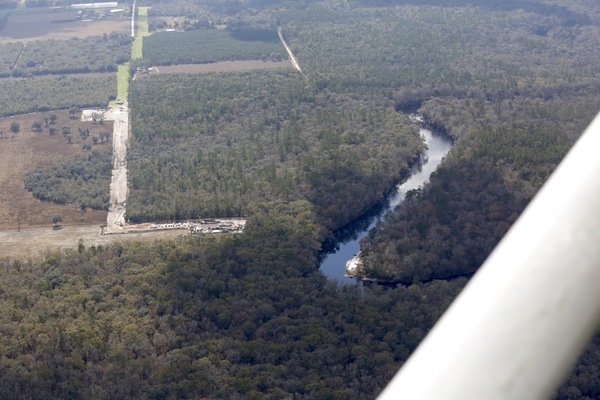
South to Suwannee River, HDD Suwannee County, RoW with pipe already buried, 30.4117310, -83.1566490Coalition spokesman John Quarterman called the pipeline a profit bonanza for private companies and a boondoggle for utility customers.
Well, I said it’s a boondoggle for the utility, namely FPL, at the expense of its customers. Here’s why I say that, including that FPL admitted in its 2016 Ten Year Plan that Florida needs no new electricity until 2024 at the earliest, contradicting FPL’s 2013 excuse for Sabal Trail.
It’s not just two connected pipelines; it’s at least five just in Florida. Audubon Florida did endorse Sabal Trail starting with FPL’s first announcement. And sure, Ms. Grover, your “safety programs are designed to prevent pipeline failures”, but they haven’t actually stopped numerous incidents of corrosion, leaks, explosions, and compressor station blowouts. Other than those things, it’s a pretty good story.
-
Joseph A. Mann Jr., FloridaBulldog.org, 23 March 2017, With help from investor-Gov. Scott, Sabal Trail natural gas pipeline looks to open in June (WWALS blog post that fisks Ms. Grover’s misinformation)
“Florida is swarming with protests, like an antbed stirred up by a 600-mile pipeline stick,” John S. Quarterman, president, WWALS Watershed Coalition

Brian Fahrenthold and Andrea Grover of Spectra Energy and John S. Quarterman on WALB, in Spectra speaks about Sabal Trail pipeline at Lowndes County Commission, by Robert Hydrick, for WALB TV, 9 December 2013. -
Susan Salisbury, Palm Beach Post, 3 March 2017,
Sabal Trail pipeline shooter killed by law enforcement in Citrus County (
WWALS blog post)
John Quarterman, Suwannee Riverkeeper, said as far as he knows, no one involved in any pipeline opposition has ever heard of Marker prior to the incident.
“As the first person ever to call for protests on the pipeline this is not what I called for,” Quarterman said Friday.
-
Molly Minta, The Fine Print, 5 February 2017,
Rise Against the Machine:
In 2013, Marion County residents began to receive letters from Sabal Trail Transmission. Now, they’ve made it their mission to save their land, and stop Sabal Trail.

Photo: Molly Minta.
An oak tree is felled by Sabal Trail construction workers.But those opposed to the pipeline don’t just have to take on corruption at the state level. The Federal Energy Regulatory Commission, the agency that granted Sabal Trail eminent domain and which oversees interstate pipeline projects, is supposed to regulate the natural gas industry and hold the companies accountable. Activists, however, contend that it does just the opposite.
“The whole system is corrupt from top to bottom,” said John Quarterman, president of the WWALS Watershed Coalition, which stands for the Withlacoochee, Willacoochee, Alapaha, Little and Suwannee rivers. He said that though FERC receives money from Congress every year, it’s self-funding, which means that it is authorized by the government to collect annual fees from the industries it regulates. FERC is the only independent executive agency in the United States with this kind of authority. In essence, Quarterman said, the agency is susceptible to being bought out by the natural gas industries.
“The word you’re looking for starts with ‘c,’ as in corrupt,” Quarterman said. “The polite way of saying it is ‘regulatory capture.’”
WWALS blog post Wide-ranging Sabal Trail opposition article by Molly Minta in The Fine Print:
FERC isn’t just authorized to collect annual fees, it brags in its annual budget request that it does pay back 100% of its Congressional allocation from fees and charges on the industries it supposedly regulates. This is the wording in FERC’s 2017 budget request:
As authorized by statute, including the Omnibus Budget Reconciliation Act of 1986, the Commission recovers the full cost of its operations through annual charges and filing fees assessed on the industries it regulates. This revenue is deposited into the Treasury as a direct offset to its appropriation, resulting in no net appropriation.
-
John S. Quarterman, Tallahassee Democrat op-ed, 29 January 2017,
 Quarterman: Sabal Trail pipeline already damaging our area
Quarterman: Sabal Trail pipeline already damaging our area
-
 Terry Richards, Valdosta Daily Times, 11 January 2017 (WWALS blog post),
Sabal Pipeline protest meeting planned
Terry Richards, Valdosta Daily Times, 11 January 2017 (WWALS blog post),
Sabal Pipeline protest meeting planned
-
John S. Quarterman, Valdosta Daily Times op-ed 8 January 2017,
Solar power versus Sabal Trail –Suwannee Riverkeeper in VDT 2017-01-08
- Richard Luscombe, The Guardian, 24 January 2017 (WWALS blog post), Why a protest camp in Florida is being called the next Standing Rock: At first glance the quiet town of Live Oak seems an unlikely venue for a stand against Big Energy. But in recent weeks it’s become a centre of opposition


